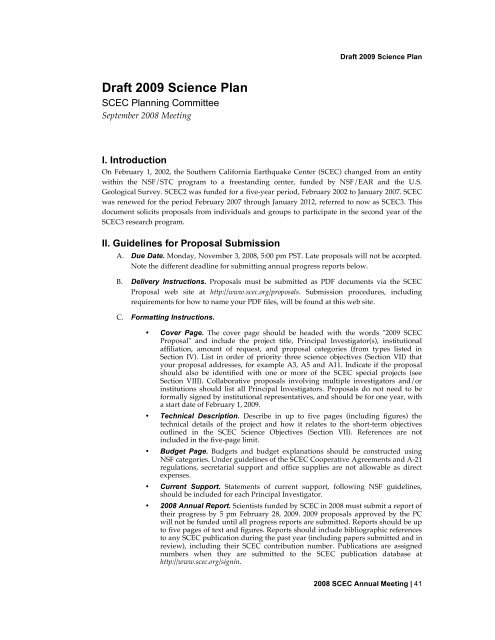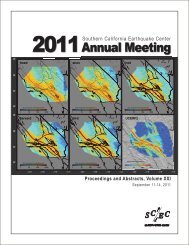Annual Meeting - SCEC.org
Annual Meeting - SCEC.org
Annual Meeting - SCEC.org
- TAGS
- annual
- meeting
- www.scec.org
You also want an ePaper? Increase the reach of your titles
YUMPU automatically turns print PDFs into web optimized ePapers that Google loves.
Draft 2009 Science Plan<br />
<strong>SCEC</strong> Planning Committee<br />
September 2008 <strong>Meeting</strong><br />
Draft 2009 Science Plan<br />
I. Introduction<br />
On February 1, 2002, the Southern California Earthquake Center (<strong>SCEC</strong>) changed from an entity<br />
within the NSF/STC program to a freestanding center, funded by NSF/EAR and the U.S.<br />
Geological Survey. <strong>SCEC</strong>2 was funded for a five-year period, February 2002 to January 2007. <strong>SCEC</strong><br />
was renewed for the period February 2007 through January 2012, referred to now as <strong>SCEC</strong>3. This<br />
document solicits proposals from individuals and groups to participate in the second year of the<br />
<strong>SCEC</strong>3 research program.<br />
II. Guidelines for Proposal Submission<br />
A. Due Date. Monday, November 3, 2008, 5:00 pm PST. Late proposals will not be accepted.<br />
Note the different deadline for submitting annual progress reports below.<br />
B. Delivery Instructions. Proposals must be submitted as PDF documents via the <strong>SCEC</strong><br />
Proposal web site at http://www.scec.<strong>org</strong>/proposals. Submission procedures, including<br />
requirements for how to name your PDF files, will be found at this web site.<br />
C. Formatting Instructions.<br />
• Cover Page. The cover page should be headed with the words "2009 <strong>SCEC</strong><br />
Proposal" and include the project title, Principal Investigator(s), institutional<br />
affiliation, amount of request, and proposal categories (from types listed in<br />
Section IV). List in order of priority three science objectives (Section VII) that<br />
your proposal addresses, for example A3, A5 and A11. Indicate if the proposal<br />
should also be identified with one or more of the <strong>SCEC</strong> special projects (see<br />
Section VIII). Collaborative proposals involving multiple investigators and/or<br />
institutions should list all Principal Investigators. Proposals do not need to be<br />
formally signed by institutional representatives, and should be for one year, with<br />
a start date of February 1, 2009.<br />
• Technical Description. Describe in up to five pages (including figures) the<br />
technical details of the project and how it relates to the short-term objectives<br />
outlined in the <strong>SCEC</strong> Science Objectives (Section VII). References are not<br />
included in the five-page limit.<br />
• Budget Page. Budgets and budget explanations should be constructed using<br />
NSF categories. Under guidelines of the <strong>SCEC</strong> Cooperative Agreements and A-21<br />
regulations, secretarial support and office supplies are not allowable as direct<br />
expenses.<br />
• Current Support. Statements of current support, following NSF guidelines,<br />
should be included for each Principal Investigator.<br />
• 2008 <strong>Annual</strong> Report. Scientists funded by <strong>SCEC</strong> in 2008 must submit a report of<br />
their progress by 5 pm February 28, 2009. 2009 proposals approved by the PC<br />
will not be funded until all progress reports are submitted. Reports should be up<br />
to five pages of text and figures. Reports should include bibliographic references<br />
to any <strong>SCEC</strong> publication during the past year (including papers submitted and in<br />
review), including their <strong>SCEC</strong> contribution number. Publications are assigned<br />
numbers when they are submitted to the <strong>SCEC</strong> publication database at<br />
http://www.scec.<strong>org</strong>/signin.<br />
2008 <strong>SCEC</strong> <strong>Annual</strong> <strong>Meeting</strong> | 41



